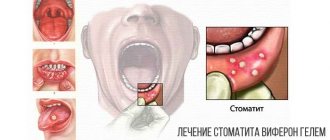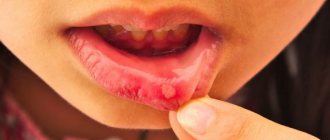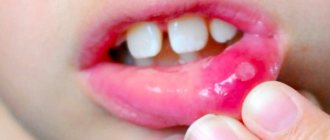From this article you will learn:
- release forms of the drug Viferon,
- instructions for use, reviews,
- clinical efficacy studies.
Viferon is a drug based on recombinant human interferon alpha-2b (Russian production), intended for the treatment of bacterial and viral infections. The drug is often prescribed for herpetic lesions of the oral mucosa in children. In addition to interferon alpha-2b, the drug contains vitamins E and C. The drug is considered safe and can be used even in newborns.
According to the manufacturer, Viferon has a large list of functional activities - primarily an antiviral effect, as well as immunomodulatory, antiproliferative and other properties. The drug has release forms - Viferon suppositories with dosages of 150,000 IU, 500,000 IU, 1,000,000 IU, 3,000,000 IU, as well as Viferon gel and ointment. The choice of release form will depend on the age of the child or adult, as well as on the location of the infectious focus (inflammation). The drug is intended for over-the-counter use.
Viferon candles: photo of packaging
For infants, the most convenient form is in the form of suppositories (candles). Accordingly, when using this form, the localization of the source of inflammation will be completely unimportant, because the drug will spread through the bloodstream. But for adults and children of middle and older age, of course, it is better to choose forms for topical use in the form of an ointment or gel. For various diseases, the choice of ointment and gel form is important.
For example, only Viferon-gel is suitable for application to the mucous membrane, because the gel form will adhere well to the moist mucosa. There is no point in applying Viferon ointment to mucous membranes. Remember that absolutely any preparations in the form of ointments or creams (i.e., fat-based) make sense to use only when the source of inflammation is localized on the skin of the face or the red border of the lips. In case of damage to the mucous membranes, preparations for topical use should only be in the form of gels.
Nosological classification (ICD-10)
- A41.9 Septicemia, unspecified
- A49.3 Mycoplasma infection, unspecified
- A59.0 Urogenital trichomoniasis
- A74.9 Chlamydial infection, unspecified
- B00.0 Herpetic eczema
- B00.1 Herpetic vesicular dermatitis
- B18 Chronic viral hepatitis
- B25.9 Cytomegalovirus disease, unspecified
- B34 Viral infection of unspecified localization
- B37.3 Candidiasis of the vulva and vagina (N77.1*)
- G03.9 Meningitis, unspecified
- J06 Acute upper respiratory tract infections of multiple and unspecified localization
- J11 Influenza, virus not identified
- J18 Pneumonia without specifying the pathogen
- N39.0 Urinary tract infection without established location
- N76 Other inflammatory diseases of the vagina and vulva
- O35.3 Fetal injury (suspected) due to maternal viral disease requiring maternal medical attention
- O35.8 Other fetal anomalies and lesions (suspected) requiring maternal medical attention
Compound
| Ointment for local and external use | 1 g |
| active substance: | |
| interferon human recombinant alpha-2 | 40000 IU |
| excipients: tocopherol acetate - 0.02 g; anhydrous lanolin - 0.34 g; medical petroleum jelly - 0.45 g; peach oil - 0.12 g; purified water - up to 1 g |
| Gel for local and external use | 1 g |
| active substance: | |
| interferon human recombinant alpha-2b | 36000 IU |
| excipients: alpha-tocopherol acetate - 0.055 g; methionine - 0.0012 g; benzoic acid - 0.00128 mg; citric acid monohydrate - 0.001 g; sodium tetraborate decahydrate - 0.0018 mg; sodium chloride - 0.004 g; human serum albumin solution 10% - 0.02 g; distilled glycerin (glycerol) - 0.02 g; carmellose sodium - 0.02 g; ethanol 95% - 0.055 g; purified water - up to 1 g |
| Suppositories for rectal use | 1 sup. |
| active substance: | |
| interferon human recombinant alpha-2b | 150000 IU |
| 500000 IU | |
| 1000000 IU | |
| 3000000 IU | |
| excipients: alpha-tocopherol acetate - 0.055/0.055/0.055/0.055 g; ascorbic acid - 0.0054/0.0081/0.0081/0.0081 g; sodium ascorbate - 0.0108/0.0162/0.0162/0.0162 g; disodium edetate dihydrate - 0.0001/0.0001/0.0001/0.0001 g; polysorbate 80 - 0.0001/0.0001/0.0001/0.0001 g | |
| base: cocoa butter and confectionery fat - up to 1 g |
Ointment "Viferon": composition, description
This is an antiviral drug that strengthens the immune system. The composition contains interferon protein, which belongs to the alpha-2b type. Available in different forms:
- ointment;
- candles;
- gel.
It is used for the prevention and treatment of diseases associated with viruses. Thanks to the destruction of pathogenic microorganisms, patients can use significantly less hormonal drugs and antibiotics, which makes them feel better and has a positive effect on their health.
The effect on the body is complex:
- antiviral – for the treatment of herpes, influenza, hepatitis, among others;
- restoration of the interferon synthesis system;
- antibacterial – treatment of mixed infections;
- stimulation of systems that synthesize antibodies;
- strengthening the immune system.
The drug stabilizes the membranes of body cells, promotes tissue regeneration, and has anti-inflammatory and powerful antioxidant effects. This contributes not only to cure from infectious pathologies, but to relatively rapid recovery.
The ointment or gel can only be stored in the refrigerator at a temperature in the range of 2-8°C. The place should be moderately damp and dark. Access for children is prohibited. The drug can be used within the expiration date, which is 2 years from the date of production.
Pharmacodynamics
Human recombinant interferon alpha-2b has pronounced immunomodulatory, antiviral, antiproliferative properties, suppresses the replication of RNA and DNA viruses.
The complex composition of the drugs (ointment, suppositories, gel) causes a number of new additional effects: in the presence of antioxidants (tocopherol acetate and/or ascorbic acid), the specific antiviral activity of human recombinant alpha-2b interferon increases, its immunomodulatory effect on T- and B-lymphocytes increases , the level of secretory immunoglobulins of class A increases, the level of immunoglobulin E normalizes, and the functioning of the endogenous interferon alpha-2b system is restored. Ascorbic acid and alpha-tocopherol acetate, being highly active antioxidants, have anti-inflammatory, membrane stabilizing, and regenerating properties. The use of the drug VIFERON® as part of complex therapy makes it possible to reduce therapeutic doses of antibacterial and hormonal drugs, as well as reduce the toxic effects of this therapy.
It has been established that when using the drug VIFERON® there are no side effects that occur with parenteral administration of interferon alfa-2b preparations, and no antibodies are formed that neutralize the antiviral activity of interferon alfa-2b.
Candle rating
To improve the child’s well-being due to teeth growth, suppositories help.
Let's look at the drugs that can be used:
Viburkol
The product is considered homeopathic because it is produced on the basis of a plant component. The suppository effectively helps with teething. It relieves the pain threshold, body temperature drops, and gum inflammation is significantly reduced.
After using the product, the child feels much better. His irritability goes away and he becomes less capricious.
1 package of the drug contains 6 suppositories. If you follow all medical prescriptions, side effects are reduced to zero. There is a possibility that an allergic reaction will occur, but this is only if the child is intolerant to a component of the drug. After the first use, it is necessary to monitor the baby’s condition.
If you have an unhealthy reaction, you should inform your doctor. He will prescribe another medicine.
The drug should be taken as prescribed by a doctor or according to the instructions for use.
The average price in pharmacies for Viburkol suppositories is 360 rubles.
Panadol
The product is available in spirit forms: syrup and candles. It is most convenient for infants to use suppositories. The product is based on paracetamol. It helps lower body temperature and relieve pain. Suppositories can be used until the child reaches 6 months of age.
The drug has several limitations when used:
- Intolerance of the body to one of the components of the drug.
- It cannot be used for pathologies with the kidneys or liver.
- For inflammation of the rectum.
- For blood disease.
The average price in pharmacies for Panadol suppositories is 65 rubles.
Nurofen
Nurofen suppositories contain ibuprofen, which has a healing effect. It is recommended to use the product for fever and pain. The dosage is calculated based on the body weight and age of the child.
It is allowed to use the drug only after the baby reaches the age of 3 months. The product must be used with caution. It is worth using suppositories in a minimal course or a one-time method and in the smallest dosage.
With prolonged use, side effects may occur. Before using the drug, you must read the instructions. The drug has a large list of restrictions on use.
The average price in pharmacies for Nurofen suppositories is 100 rubles.
Viferon
Antiviral drug. The composition includes interferon alpha and vitamins E, C. The drug is prescribed for colds and for teeth growth. The drug does not help reduce fever and does not relieve pain. They only increase the baby’s immunity.
During teething, the temperature rises and the general condition of the body weakens. This may cause a viral disease. To prevent this from happening, Viveron suppositories are prescribed. They promote immunity to fight diseases.
The average price in pharmacies for Viveron suppositories is 170 rubles.
Indications for the drug Viferon®
Ointment
viral (including herpetic) lesions of the skin and mucous membranes of various localizations;
treatment of influenza and acute respiratory viral infections in children over 1 year of age.
Gel
in complex therapy of ARVI, incl. influenza, frequent and prolonged acute respiratory viral infections, incl. complicated by bacterial infection;
prevention of acute respiratory viral infections, including influenza;
in complex therapy of recurrent stenotic laryngotracheobronchitis;
prevention of recurrent stenosing laryngotracheobronchitis;
in complex therapy of acute and exacerbations of chronic recurrent herpetic infections of the skin and mucous membranes, incl. urogenital form of herpetic infection;
in complex therapy of herpetic cervicitis.
Suppositories
In complex therapy:
ARVI, including influenza, incl. complicated by bacterial infection, pneumonia (bacterial, viral, chlamydial) in children and adults;
infectious and inflammatory diseases of newborns, incl. premature babies: meningitis (bacterial, viral), sepsis, intrauterine infection (chlamydia, herpes, CMV infection, enterovirus infection, candidiasis, including visceral, mycoplasmosis);
chronic viral hepatitis B, C, D in children and adults, incl. in combination with the use of plasmapheresis and hemosorption for chronic viral hepatitis of pronounced activity, complicated by cirrhosis of the liver;
infectious and inflammatory diseases of the urogenital tract (chlamydia, CMV infection, ureaplasmosis, trichomoniasis, gardnerellosis, papillomavirus infection, bacterial vaginosis, recurrent vaginal candidiasis, mycoplasmosis) in adults;
primary or recurrent herpetic infection of the skin and mucous membranes, localized form, mild to moderate course, incl. urogenital form in adults.
Indications and contraindications
When the first teeth erupt, the baby may begin to be capricious. The child experiences sleep disturbances, refuses to eat, body temperature rises, and the baby experiences pain. Such symptoms can be observed in many diseases, this is the reason to make sure that the symptoms appear due to the growth of teeth.
As soon as the baby pulls everything into the oral cavity, parents need to examine the mouth and gums. If the gum is inflamed and there is a whitish lump on it, then this indicates only one thing. The child’s pain will go away after the tooth passes through the bone tissue and gums.
It can take some time. To eliminate discomfort, you can resort to medication.
If the baby is correctly identified as feeling unwell, suppositories have no contraindications. Of course, if the baby is not allergic to the components included in the product.
In pharmacology, there are 2 types of drugs that can help with tooth growth:
- local painkiller, these are gels or ointments;
- anesthetics that are taken orally.
A suppository is considered one of the safe and effective medications. It is recommended to resort to his help as a last resort, when the child can no longer endure the pain, and the pediatrician prescribes their appointment. You should not self-medicate; it is better to consult your pediatrician.
For pain, children are prescribed medications that can have a mild effect. The age of the child also becomes a criterion when choosing medications. For infants, suppositories are prescribed, for older children - suspensions.
Use during pregnancy and breastfeeding
Ointment: since when applied externally and locally, the systemic absorption of interferon is low and the drug has an effect only in the lesion, it is possible to use the drug VIFERON® during pregnancy and lactation.
Gel: since the systemic absorption of interferon when applied topically is low and the drug has an effect only in the lesion, it is possible to use the drug VIFERON® during pregnancy and breastfeeding. During lactation, do not use the drug on the area of the nipples and areola.
Suppositories: the drug is approved for use from the 14th week of pregnancy. There are no restrictions for use during lactation.
The drug Viferon: reviews and studies
Let us say right away that the treatment of viral and bacterial diseases with interferons is recognized in the USA and Europe, and even in Kazakhstan, which is close to us, as ineffective. Clinical studies that were published in Russia have a level of evidence – class II (B). This means that small randomized controlled clinical trials were conducted, involving only a small number of people. From the point of view of evidence-based medicine, such studies do not inspire much confidence. Nevertheless, sales of Viferon are a very large market of several billion rubles.
As a doctor (my personal opinion), I do not consider the drug Viferon to be effective, and I have never seen a significant positive result from its mono use. As for patients, patient reviews of Viferon are absolutely diverse, because... Patients usually take several medications at once. Therefore, it is easy to make a mistake in interpreting the results, because the result could have been achieved through another drug, or simply through the natural cessation of the disease. This is well demonstrated by the proverb: To treat a cold or not to treat it, it will still go away in 7 days.
Side effects
Ointment: in most cases, VIFERON® is well tolerated. When applied to the nasal mucosa, side effects are weak and transient and disappear on their own after discontinuation of the drug.
Gel: in extremely rare cases, a local allergic reaction may occur in some highly sensitive individuals. In such cases, stop using the drug.
Suppositories: in rare cases - allergic reactions (skin rashes, itching). These phenomena are reversible and disappear 72 hours after stopping the drug.
Recommendations for use
Suppositories must be used exactly as prescribed by the pediatrician; the dosage must be observed and the drug must be used correctly.
How to use candles:
- The person administering the product must wash their hands. To do this, it is better to use an antibacterial agent or laundry soap. This is necessary so that the infection does not enter the child’s colon.
- If the child is under 1 year old, then he is placed on his back and his legs are held in his hands. When the baby is more than a year old, he is placed on his side and his legs are bent towards his stomach.
- Before administering the product , you must remove the packaging and warm it in your hands. Lubricate the child's anus with cream.
- Spread your butt and insert the product into the anus. Close the child’s buttocks and wait a while. This is necessary so that the drug does not come out.
- The baby should lie down for a while so that the product is better absorbed and absorbed.
Directions for use and doses
Ointment, externally and locally. For herpes infection, apply a thin layer of ointment to the affected areas 3-4 times a day and rub in gently. Duration of treatment is 5–7 days. It is recommended to begin treatment immediately when the first signs of damage to the skin and mucous membranes appear (itching, burning, redness). When treating recurrent herpes, it is advisable to begin treatment in the prodromal period or at the very beginning of the appearance of signs of relapse.
To treat influenza and other acute respiratory viral infections, the ointment is applied in a thin layer to the mucous membrane of the nasal passages 3-4 times a day throughout the entire period of the disease.
Children from 1 year to 2 years - 2500 IU (1 pea with a diameter of 0.5 cm) 3 times a day; from 2 to 12 years - 2500 IU (1 pea with a diameter of 0.5 cm) 4 times a day; from 12 to 18 years - 5000 IU (1 pea with a diameter of 1 cm) 4 times a day. The duration of treatment is 5 days.
Gel, externally and locally.
In the complex therapy of ARVI, including influenza, long-term and frequent ARVI, incl. complicated by a bacterial infection: a strip of gel no more than 0.5 cm long is applied to the previously dried surface of the nasal mucosa and/or to the surface of the tonsils 3-5 times a day using a spatula or a cotton swab/cotton swab (see Note). The course of treatment is 5 days; if necessary, the course can be extended.
Prevention of ARVI, including influenza: during the period of rising incidence, a strip of gel no more than 0.5 cm long is applied to the previously dried surface of the nasal mucosa and/or to the surface of the tonsils 2 times a day for 2–4 weeks.
In complex therapy of recurrent stenosing laryngotracheobronchitis: a strip of gel no more than 0.5 cm long is applied to the surface of the palatine tonsils using a spatula or a cotton swab/cotton swab in the acute period of the disease 5 times a day, for 5–7 days, then 3 times a day day for the next 3 weeks.
Prevention of recurrent stenosing laryngotracheobronchitis: a strip of gel no more than 0.5 cm long is applied to the surface of the tonsils using a spatula or a cotton swab/cotton swab 2 times a day for 3-4 weeks, courses are repeated 2 times a year.
In complex therapy of acute and chronic recurrent herpetic infection (at the first signs of the disease or during the period of warning signs): a strip of gel no more than 0.5 cm long is applied using a spatula or a cotton swab/cotton swab to a previously dried affected surface 3–5 times per day. day for 5–6 days, if necessary, the duration of the course is increased until clinical manifestations disappear.
In complex therapy of herpetic cervicitis: 1 ml of gel is applied with a cotton swab to the surface of the cervix, previously cleared of mucus, 2 times a day for 7 days; if necessary, the duration of the course can be increased to 14 days.
Note. The gel is applied to the mucous membrane of the nasal cavity after cleansing the nasal passages, and to the surface of the palatine tonsils - 30 minutes after eating. When applying the gel to the tonsils, do not touch the tonsils with a cotton swab, but only with the gel; the gel flows down on its own along the surface of the tonsil. When applying the gel to the cervix, you should first remove mucus and discharge from the vaginal vaults and cervix with a cotton or gauze swab.
When applying the gel to the affected areas of the skin and mucous membranes, after 30–40 minutes a thin film is formed, onto which the drug is again applied. If desired, the film can be peeled off or washed off with water before reapplying the drug.
Suppositories, rectally.
1 suppository contains human recombinant interferon alpha-2b as an active substance in the indicated dosages (150,000 IU, 500,000 IU, 1,000,000 IU, 3,000,000 IU).
Acute respiratory viral infections, including influenza, incl. complicated by bacterial infection, pneumonia (bacterial, viral, chlamydial) in children and adults as part of complex therapy. Recommended dose for adults, including pregnant women and children over 7 years old VIFERON® 500,000 IU, 1 suppository 2 times a day after 12 hours every day for 5 days. According to clinical indications, therapy can be continued.
Children under 7 years old, incl. For newborns and premature infants with a gestational age of more than 34 weeks, it is recommended to use the drug VIFERON® 150,000 IU, 1 suppository 2 times a day after 12 hours every day for 5 days. According to clinical indications, therapy can be continued. The break between courses is 5 days.
Premature newborns with a gestational age of less than 34 weeks are recommended to use the drug VIFERON® 150,000 IU, 1 suppository 3 times a day after 8 hours every day for 5 days. According to clinical indications, therapy can be continued. The break between courses is 5 days.
Infectious and inflammatory diseases of newborns, incl. premature babies: meningitis (bacterial, viral), sepsis, intrauterine infection (chlamydia, herpes, CMV infection, enterovirus infection, candidiasis, including visceral, mycoplasmosis) as part of complex therapy. Recommended dose for newborns, incl. premature babies with a gestational age of more than 34 weeks VIFERON® 150,000 IU daily, 1 suppository 2 times a day after 12 hours. The course of treatment is 5 days.
Premature newborns with a gestational age of less than 34 weeks are recommended to use the drug VIFERON® 150,000 IU daily, 1 suppository 3 times a day after 8 hours. The course of treatment is 5 days.
Recommended number of courses for various infectious and inflammatory diseases: sepsis - 2-3 courses, meningitis - 1-2 courses, herpes infection - 2 courses, enterovirus infection - 1-2 courses, CMV infection - 2-3 courses, mycoplasmosis, candidiasis , including visceral - 2-3 courses. The break between courses is 5 days. According to clinical indications, therapy can be continued.
Chronic viral hepatitis B, C, D in children and adults as part of complex therapy, incl. in combination with the use of plasmapheresis and hemosorption for chronic viral hepatitis of pronounced activity, complicated by cirrhosis of the liver. The recommended dose for adults is VIFERON® 3,000,000 IU, 1 suppository 2 times a day every 12 hours every day for 10 days, then 3 times a week every other day for 6–12 months. The duration of treatment is determined by clinical effectiveness and laboratory parameters.
For children under 6 months of age, 300,000–500,000 IU per day is recommended; at the age of 6 to 12 months - 500,000 IU per day.
For children aged 1 to 7 years, 3,000,000 IU per 1 m2 of body surface area per day is recommended.
For children over 7 years old, 5,000,000 IU per 1 m2 of body surface area per day is recommended.
The drug is used 2 times a day every 12 hours for the first 10 days, then 3 times a week every other day for 6–12 months. The duration of treatment is determined by clinical effectiveness and laboratory parameters.
The daily dose of the drug for each patient is calculated by multiplying the recommended dose for a given age by the body surface area calculated using the nomogram for calculating body surface area by height and weight according to Garford, Terry and Rourke. The calculation of a single dose is carried out by dividing the calculated daily dose into 2 administrations, the resulting value is rounded up to the dosage of the suppository.
In case of chronic viral hepatitis of pronounced activity and liver cirrhosis, before plasmapheresis and/or hemosorption, it is recommended to use VIFERON® 150,000 IU for children under 7 years of age, VIFERON® 500,000 IU for children over 7 years of age, 1 suppository 2 times a day every 12 hours. within 14 days.
Infectious and inflammatory diseases of the urogenital tract (chlamydia, CMV infection, ureaplasmosis, trichomoniasis, gardnerellosis, papillomavirus infection, bacterial vaginosis, recurrent vaginal candidiasis, mycoplasmosis) in adults, including pregnant women as part of complex therapy. The recommended dose for adults is VIFERON® 500,000 IU, 1 suppository 2 times a day after 12 hours every day for 5–10 days. According to clinical indications, therapy can be continued.
Pregnant women from the second trimester of pregnancy (starting from 14 weeks of gestation) are recommended VIFERON® 500,000 IU, 1 suppository 2 times a day every 12 hours for 10 days, then 3 times for 9 days with an interval of 3 days (on the 4th day) 1 suppository 2 times a day after 12 hours. Then every 4 weeks until delivery VIFERON® 150,000 IU, 1 suppository 2 times a day after 12 hours every day for 5 days. If necessary, it is indicated before delivery (from 38 weeks of gestation) VIFERON® 500,000 IU, 1 suppository 2 times a day after 12 hours every day for 10 days.
Primary or recurrent herpetic infection of the skin and mucous membranes, localized form, mild to moderate course, incl. urogenital form in adults, including pregnant women. The recommended dose for adults is VIFERON® 1,000,000 IU, 1 suppository 2 times a day after 12 hours every day for 10 days or more for recurrent infections. According to clinical indications, therapy can be continued. It is recommended to begin treatment immediately when the first signs of damage to the skin and mucous membranes appear (itching, burning, redness). When treating recurrent herpes, it is advisable to begin treatment in the prodromal period or at the very beginning of signs of relapse.
Pregnant women from the second trimester of pregnancy (starting from 14 weeks of gestation) are recommended VIFERON® 500,000 IU, 1 suppository 2 times a day every 12 hours for 10 days, then 3 times for 9 days with an interval of 3 days (on the 4th day) 1 suppository 2 times a day after 12 hours. Then every 4 weeks until delivery VIFERON® 150,000 IU, 1 suppository 2 times a day after 12 hours every day for 5 days. If necessary, it is indicated before delivery (from 38 weeks of gestation) VIFERON® 500,000 IU, 1 suppository 2 times a day after 12 hours every day for 10 days.
Viferon gel: instructions, price
Viferon gel is used (as well as suppositories) for the treatment of acute and recurrent herpetic stomatitis. The gel is applied 4-5 times a day directly to the lesions on the oral mucosa (24stoma.ru). Before applying the gel, it is advisable to dry the mucous membrane with a dry gauze swab, then apply the gel to the lesions using a spatula or a cotton swab. The course of treatment is from 5 to 10 days (until symptoms disappear).
Viferon gel is also suitable for treating not only the mucous membrane, but also the red border of the lips. The drug can be used by pregnant and lactating women without any restrictions (due to the low absorption of the active ingredients through the mucous membrane). Viferon gel – the price will be 0t 150 rubles.









